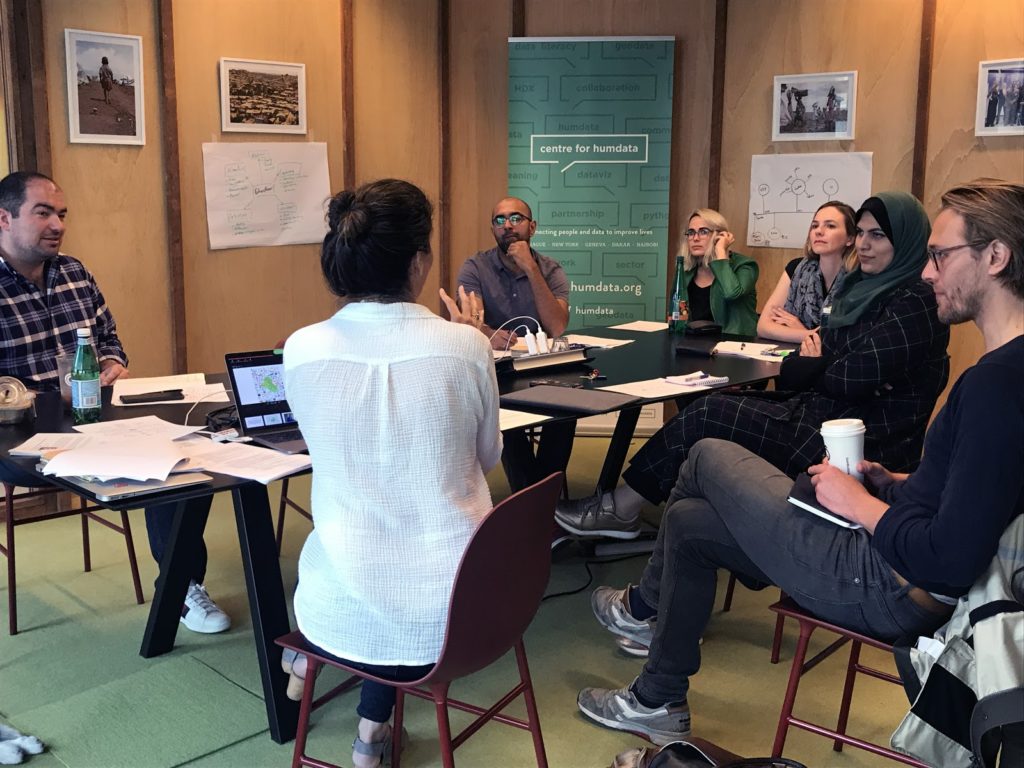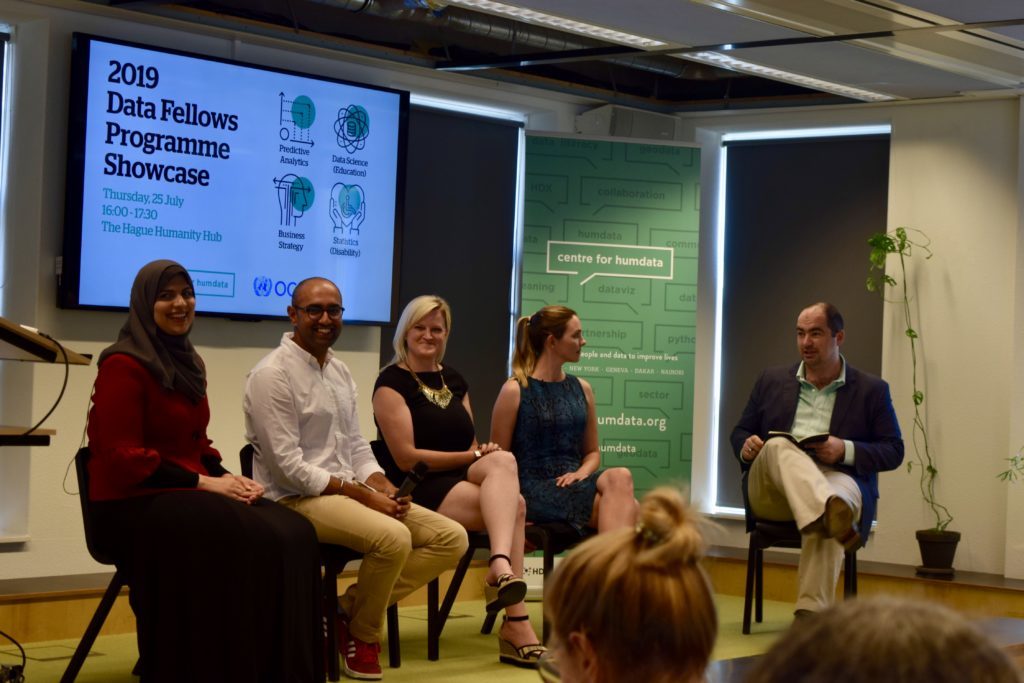Share
The Centre’s Data Fellows Programme serves as a critical vehicle for exploring new ways to increase the use and impact of data in the humanitarian sector. In its first two years, the programme has enabled the design of a new workstream on predictive analytics, created innovative approaches to data storytelling, and generated new features for the Humanitarian Data Exchange. Here, we summarize the work of the eight Fellows, take stock of achievements and reflect on lessons learned.
The Data Fellows Programme was launched in 2018 with the goal of exposing the Centre and its partners to new areas of technical expertise related to humanitarian data. Our inaugural class of Fellows focused on data science, data storytelling, predictive analytics, and user experience research. In 2019, we continued the focus on data science and predictive analytics, and introduced the new areas for business strategy and statistics.

The Fellows work from The Hague in June and July each year to design and deliver targeted projects in close collaboration with the Centre team and partners. The table below summarizes the role of each Fellow, the focus of their projects, and the impact of their work. The Fellows’ blogs, showcase presentations (where available) and key deliverables are linked for reference.
2018 and 2019 Data Fellows
| Class | Name and Role | Focus of Fellowship Project | Impact |
| 2018 | Abdulaziz Al-Homaid
Data Science Fellow (Education) |
Abdulaziz focused on data about education in emergencies. He developed an approach and a technical tool to ‘crawl’ for education datasets and generate simple analytics to show what data is available and missing across crises and organisations. | The approach and tool informed ongoing work by the Centre’s Data Partnerships Team to monitor and raise awareness of the increasing range of education-related datasets on HDX. |
| Manu Singh
Predictive Analytics Fellow |
Manu explored how predictive analytics might inform humanitarian financing decisions, with a focus on Somalia. She developed a model to predict OCHA-managed pooled fund allocations in the context of food insecurity, with a view to prevent famine. | The pilot model helped OCHA to think strategically about how to approach the use of predictive analytics in humanitarian response. It also enabled OCHA to engage in technical discussions with partners on the development and application of predictive models, including through a workshop organized by the Centre in April 2019. | |
| Haoyun Su
Data Storytelling Fellow |
Haoyun focused on data storytelling and used her journalism expertise to humanize data points and tell stories about displaced people. She developed two data stories about the experience of internally displaced persons (IDPs), including a global overview of displacement trends and the journey taken by a South Sudanese family to flee violence and find refuge. | The data stories were widely viewed and allowed the Centre to reach new audiences. Based on this success, a second data story was developed about the humanitarian situation in the Central African Republic. | |
| Laith Ulaby
User Experience Research Fellow |
Laith worked to understand how users in different roles and locations experience HDX. His research generated a wealth of insights and recommendations on ways to optimize the platform for different audiences. | The insights led to the creation of a quarterly email to the top organizations on HDX updating them on how their data is being used. The HDX team also improved the onboarding process for new registered users. | |
| 2019 | Ghadeer Abouda
Data Science Fellow (Education) |
Ghadeer focused on improving access to education data on HDX. She applied machine learning techniques to improve the tagging of datasets on HDX so that users can more easily find the data they are looking for. | The tag suggestion module is being further refined by the HDX team and will be integrated into the data upload process in the future. |
| Gagan Narula
Statistics Fellow (Disability) |
Gagan applied advanced statistical analysis to disability datasets related to the Syria crisis. He explored two techniques, mutual information and principal component analysis, to understand how people living with disabilities experience emergencies. | The research findings have been presented to stakeholders focused on disability and inclusion in humanitarian response for future use in their own data collection and analysis work. The analytical approach is being used by OCHA Iraq to understand disability prevalence as part of the 2020 Humanitarian Needs Overview and Humanitarian Response Plan. | |
| Blair Palmer
Business Strategy Fellow |
Blair examined the landscape of existing and potential private sector and foundation partners for the Centre and developed a strategic framework to support new partnerships moving forward. | The Centre will incorporate the partnership analysis into its next phase business plan for 2020 onwards. | |
| Dani Poole
Predictive Analytics Fellow |
Dani focused on developing a peer review framework for predictive analytics in humanitarian response. She did this by exploring best practice in academia, interviewing experts and stakeholders, and developing a draft framework for consultation with partners. | The Centre released the draft framework at an event in September 2019. The framework will be tested and further refined and will be a core aspect of the Centre’s new Predictive Analytics workstream. |
Lessons learned
Our overall approach to the Data Fellows Programme has evolved over the past two years. In addition to the lessons learned from the inaugural class as summarized in this blog, the following points stand out from the second iteration of the programme:
- Recruit the right talent and build a cohesive class
- Explain the humanitarian sector
- Focus on concrete problems
- Ensure a clear pathway for the uptake of solutions
- Showcase results to build community
1. Recruit the right talent and build a cohesive class
Over 1,250 talented individuals from 96 different countries have applied for the Data Fellows Programme since its inception. Although we received fewer applications (565) in 2019 than in 2018 (700), the quality and relevance of applications increased considerably in the second year. Selected Fellows have come from China, India, Qatar, and the US. The continued success of the programme will depend on our ability to attract diverse applicants with the right technical skills, dedication to the humanitarian mission, and a willingness to tackle complex challenges.
Our experience has also shown that we need to ensure that the Fellows come together cohesively as a class. Even though each Fellow is focused on delivering their own project, a collaborative team dynamic helps them to succeed individually and as a group. For the 2019 class, we introduced an intensive four-day ‘bootcamp’ which let the Fellows get to know each other by working together on smaller projects. Delivered by the Copenhagen Institute for Interaction Design (CIID), the bootcamp introduced the Fellows to design thinking methods and tools that they could apply in their projects. It also helped expose them to different aspects of the Centre’s work through user research and creative problem solving activities. Ghadeer Abouda developed her fellowship project around a problem that was explored during the bootcamp.
2. Explain the humanitarian sector
The Fellows are technical experts with an interest in the humanitarian sector. In refining the approach to the programme between the first and second cohorts, we decided to add a lecture series on the humanitarian system. University of Virginia Professor Kirsten Gelsdorf joined as a Senior Fellow to provide the Fellows with broad exposure to key topics (summarized in the table below) in order to ground their projects in the operational realities of the sector.
| Understanding the Humanitarian World – A Lecture Series for the 2019 Data Fellows |
|
This investment helped establish a common understanding of the humanitarian system amongst the Fellows. In their feedback, each of the Fellows recognized the value of the lecture series and pointed to different ways that this prepared them for their projects. As a result, we plan to include the course in all future programmes.
3. Focus on concrete problems
For the 2018 class, the Fellows were asked to define the problem that they would address during the first weeks of the programme. Although this ensured ownership of the problem statement, the Fellows were rushed with their solution development given the eight week timeline. Drawing on this experience from the inaugural class, the 2019 Fellows were given broad problem areas at the start of the programme.
In order to maximize the time spent solving problems during the fellowship, we will again provide concrete challenges for the next class of Fellows. We may also try to focus more on applied technical work rather than on research as the latter has proven more challenging in terms of uptake. If you have ideas for projects that future classes of Fellows could focus on, we would love to hear from you.
4. Ensure a clear pathway for the uptake of solutions
One of the most important considerations for the Fellows in designing their projects is how the solutions they develop will be implemented or further developed by the Centre and its partners after the programme ends. In both years, the most successful projects have been those with clear paths for implementation. Such uptake can be fostered in a number of ways, from pairing a Fellow with a ‘client’ (from our team or a partner organization) to linking a Fellow’s project to an ongoing area of work within the Centre.
For example, the Fellows that focused on predictive analytics broke new ground for the Centre by creating a pilot model (2018) and a peer review framework (2019). The traction from this work, and the partnerships that were developed as a result of it, led the Centre to create a new workstream for predictive analytics that is focused on models, peer review and community. Likewise, the HDX team had been working to improve the tagging of education datasets on the platform and the work of the two Data Scientists made it easier to find this data (see our new education in emergencies thematic page on HDX here).
5. Showcase results to build community
We host a Programme Showcase at the end of the summer to give the Fellows a chance to share their results. This event has attracted a great deal of interest and offers a unique opportunity to connect with partners in The Hague and farther afield. It also acts as an incentive to Fellows to complete their projects and bring closure to their work.

We also work closely with each Fellow to publish a blog outlining their experience and the outcomes of their projects. This year, we developed a video of each Fellow’s showcase presentation to increase accessibility of the findings. In addition to helping communicate the value and impact of the programme, the blogs and videos help future applicants and partners to understand how we work and what we are looking for.
Learn about the second year of the Centre’s Data Fellows Programme which took place in The Hague in June and July 2019.
* * * * *
For those of you interested in applying to the programme, we will advertise the new fellowships in early 2020. Sign up to our mailing list and follow us on Twitter @humdata for the announcement. If you are interested in working with our 2020 class of Fellows, we would love to hear from you. Email us at centrehumdata@un.org.
The Centre’s Data Fellows Programme is undertaken in partnership with the Education Above All Foundation. Learn more about the 2019 Data Fellows Programme, see video and photos from final presentations at the Data Fellows Programme Showcase, and read about the work from the Business Strategy and Data Science (Education), Predictive Analytics, and Statistics (Disability Data) Fellows.